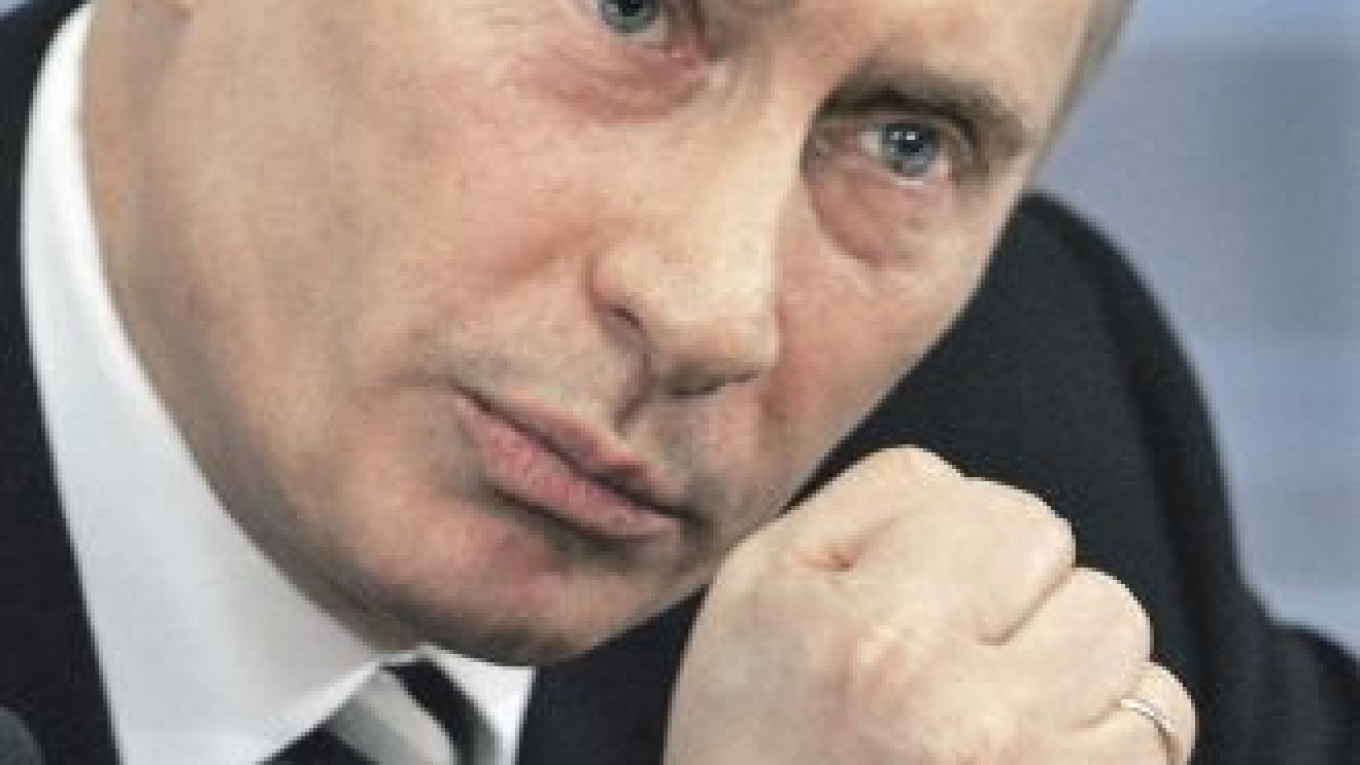President Vladimir Putin's expensive taste is one of his "most serious reasons for holding on to power," the Solidarity opposition group said in a report released Tuesday.
Putin has 20 residencies at his disposal, more than 50 planes and helicopters, a fleet of 700 cars and four yachts, according to the report presented by opposition activists Boris Nemtsov and Leonid Martynyuk.
"This is a lifestyle more luxurious than that of a sheik or an oligarch," Nemtsov told reporters in the headquarters of Solidarity, which he co-chairs.
He argued that Putin makes little distinction between state and private property and that the riches have chained him to power "like a maniac" during the past 12 years.
Earlier this year, Putin officially declared an annual income of $112,000 for 2011, a quarter of what U.S. President Barack Obama made.
Solidarity's 32-page report, also posted online at Putin-Itogi.ru, is titled "The Life of a Galley Slave," a dig at Putin's famous 2008 statement that he "toiled like a slave in a galley" during his first two terms as president. Its authors say they uncovered nothing new but collected all available information on the topic.
The Kremlin quickly dismissed the accusations. "We do not comment on nonsense," Viktor Khrekov, spokesman for the Office for Presidential Affairs, which manages the Kremlin's assets, said by telephone.
Khrekov said it would be wrong to claim that the residences "belong" to Putin. There are only three official presidential estates, he said: the Kremlin; Novo-Ogaryovo, west of Moscow; and Bocharov Ruchei, near the Black Sea resort town Sochi.
Other estates cited in the Solidarity report include a lavish villa in Paris and a secretive residence in the Novgorod region called Dolgiye Borody, where Putin hosted a private concert by British ABBA tribute band Bj??rn Again in 2009, the group's founder, Rod Stephen, said in a telephone interview from London.
Also listed is the massive "Project South" near the Black Sea port of Gelendzhyk, which was dubbed "Putin's Palace" after it was uncovered by local bloggers and activists in 2010. The Kremlin has vehemently denied any links to the estate.
Khrekov also rejected the report's claim that the number of government estates had almost doubled over the past decade. "We are actually reducing their numbers," he said, citing Shuiskaya Chupa, the former Karelia residence of Boris Yeltsin, which was auctioned off to Alexei Mordashov's S-Group last year.
The spokesman also denied that the Kremlin possesses expensive yachts. The report, citing national media, lists the 53.7-meter Sirius, saying it was bought by the Office for Presidential Affairs for an undisclosed sum in 2011, and the 57-meter Olympia, which it describes as the "jewel of the Kremlin flotilla."
Khrekov said the president "has one boat for functions." He would not disclose the boat's name, however, saying merely that it was not identical to the ships named in the report.
Nemtsov said he aims to spread the report to as many citizens as possible, including those who do not get their news from the Internet. But this could be an uphill task.
Just 5,000 copies have been made, as publishing houses refused to print it, said Solidarity spokeswoman Olga Shorina.
Related articles:
A Message from The Moscow Times:
Dear readers,
We are facing unprecedented challenges. Russia's Prosecutor General's Office has designated The Moscow Times as an "undesirable" organization, criminalizing our work and putting our staff at risk of prosecution. This follows our earlier unjust labeling as a "foreign agent."
These actions are direct attempts to silence independent journalism in Russia. The authorities claim our work "discredits the decisions of the Russian leadership." We see things differently: we strive to provide accurate, unbiased reporting on Russia.
We, the journalists of The Moscow Times, refuse to be silenced. But to continue our work, we need your help.
Your support, no matter how small, makes a world of difference. If you can, please support us monthly starting from just $2. It's quick to set up, and every contribution makes a significant impact.
By supporting The Moscow Times, you're defending open, independent journalism in the face of repression. Thank you for standing with us.
Remind me later.


